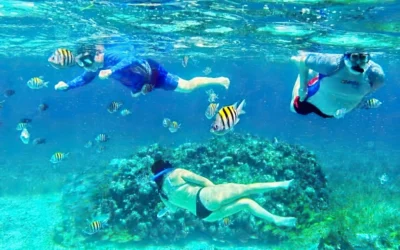- Choose a filtration method suited to your travel: pump, bottle/straw, chemical tablets, or boiling depending on location and needs.
- Filters remove chemicals and taste; purifiers (RO, deionization, distillation, UV, boiling) eliminate up to 95% of contaminants and bacteria.
- Chlorine dioxide and iodine tablets are portable EPA-approved options; iodine has contraindications for pregnant people and thyroid conditions.
- When tools are unavailable, use bottled water, avoid ice, seek running water, or boil water to ensure safety.
Regulating your water quality is an important component of traveling.
As you consider taking a trip to a new country or venturing into the great outdoors, there are many factors to consider. One of these is water filtration. Sometimes we take good quality drinking water for granted, but this is not the case in many travel settings. Drinking unclean water, whether in a foreign place or from a stream can have detrimental effects to your health. So much water is filled with harmful bacteria, chlorine, chemicals, and pesticides. Obviously none of these are good for you. Save yourself the stress of such situations by being proactive in your water filtration. This means knowing how to choose a water filter.
Fortunately, there are a number of water purification methods available to travelers. Do your research now and learn how to choose a water filter. You will thank yourself later. Lucky for you, we have done the research this time, so of course the hard part is over. Check out these helpful tips to guide you in your search for the perfect water filtering system.
Here is what you need to know on how to choose a water filter.
Types of Water Filters and Purifiers
There are many water filtration tools available for travelers of all types. As you learn how to choose a water filter, it is essential to know your options. Pump filters allow for the purification of large quantities of water and offer a high overall performance. Both bottle and straw filters and purifiers provide an ideal low cost and lightweight purification option. These types of water filters work best for an active or outdoor travel style. Water purification chemicals are also low cost and low maintenance as well as simple to use. Each water filtration method includes its own set of pros and cons. Try out a few of these options in order to get an idea of what is out there.
Water Filters vs. Water Purifiers
Water filters and purifiers are the two main types of water filtration you will encounter. These are the two names you will frequently encounter as you learn how to choose a water filter. Each of these options has a different purpose, so it is important to understand their uses before you purchase.
First, water filters are made up of a spongy substance designed to eliminate harmful toxins and chemicals from your water, making it safe to drink. Often these materials are composed of activated carbon, which is ideal for this process. The water filtration process also helps remove unpleasant tastes and smells from your water. This option is perfect for hiking or those on the go adventures. Water filters come in transportable, easy to use designs, such as straws or water bottle filters. If you use any of these types of tools, you are utilizing the power of water filtration.
Water purification takes your H2O quality to the next level. These systems are purposed to get rid of up to 95% of any contaminants in your water. Keep in mind that water purification is ideal when traveling to a less-developed country, or somewhere where the water quality is extremely poor. This is a safer option to ensure that your water is not contaminated with any bacteria. The top three water purifying technologies are reverse-osmosis, deionization, and distillation, so keep an eye out for these keywords in your search. Methods such as boiling water or using ultraviolet light are both ways to ensure effective water purification.
Purification Chemicals (Chlorine and Iodine Tablets)
This method is rather unconventional but works just the same. Carrying certain chemicals with you ensures that you always have a way to purify your water quickly. Water purification treatment options include both Chlorine Dioxide and Iodine tablets. Chlorine Dioxide and Iodine tablets meet the EPA guideline criteria as an effective way to purify water. These tiny tablets are a simple means to clean the water you intend to drink. Their small size and portability make them a favorable option to have on the go. The only downside is that it can take anywhere from 30 minutes to four hours to ensure that the water is completely purified.
Iodine comes in multiple forms: tablets, crystals, or tinctures. This product works the same way Chlorine Dioxide does. With Iodine, however, note that it is not for everyone. This product is not recommended for pregnant women or those with thyroid issues. Make sure you do the research on the ingredients and potential side effects before utilizing a purification chemical.
Alternative Methods
While it is helpful to have your own water filtration tools on hand, there may be times where you do not have access to them. If you forgot your water bottle filter or purification tablets at home, do not worry. There are other ways to ensure that the water you are drinking is safe. Of course, if you are in a foreign country where you are unsure if the water is safe, drinking bottled water is a good option. Additionally, avoid adding ice to your beverages at restaurants, as the water used is often unclean. Know that if you need clean water while camping but have no way to purify water, boiling it works best. Once your personal water supply runs low, try to locate water from a running stream and then boil it over your campfire.
Knowing how to choose a water filter will change the way you travel.
Clearly safe drinking water is an important part of your travel experience. If you do your planning and research now, it saves a scramble for clean water later. When you know how to choose a water filter, you can pick out the travel option that works best for you. Whether this is a water bottle filter straw or making your own water filter, your options are limitless. Feel free to try out a few different methods in a variety of settings to figure out your favorite type. Don’t underestimate the power of pure water when traveling; this is something to seriously consider. Fortunately, you now know how to choose a water filter, so you are off to a good start when it comes to clean drinking water.
Related Article: 7 Best Portable Water Filters For Your Outdoor Adventures






